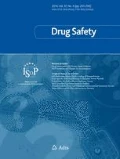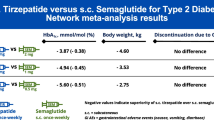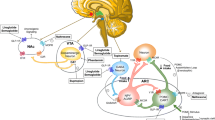Abstract
Obesity is a major health problem worldwide. It is associated with cardiovascular diseases, diabetes mellitus and decreased longevity. In managing obesity, diet and exercise are essential; pharmacological therapy may be added for obese patients or overweight patients with cardiovascular risk factors. Sibutramine is a serotonergic and adrenergic drug that reduces food intake and increases thermogenesis. It reduces bodyweight by about 4.2 kg after 12 months, and improves blood glucose and lipids; however, it can increase heart rate and blood pressure. In the SCOUT (Sibutramine Cardiovascular OUTcomes) study, sibutramine increased serious cardiovascular events, such as stroke or myocardial infarction, compared with placebo, and was consequently withdrawn from the market. The lesson learnt from this is the importance of patient selection, limiting the duration of treatment and stopping treatment in non-responders. Currently, phentermine and amfepramone (diethylpropion) are approved for short-term treatment of obesity (up to 3 months) and orlistat is approved for longer-term treatment; however, the gastrointestinal adverse effects of orlistat may be intolerable for some patients. There is now a clear need to find anti-obesity drugs that are effective and safe in the long term.



Similar content being viewed by others
References
Flegal KM, Carroll MD, Ogden CL, et al. Prevalence and trends in obesity among US adults, 1999–2008. JAMA 2010; 303(3): 235–41
Ford ES, Mokdad AH, Giles WH. Trends in waist circumference among U.S. adults. Obes Res 2003; 11: 1223–31
Kopelman P. Health risks associated with overweight and obesity. Obes Rev 2007; 8 Suppl. 1: 13–7
Hubert H, Feinleib M, McNamara PM, et al. Obesity as an independent risk factor for cardiovascular disease: a 26-year follow-up of participants in the Framingham Heart Study. Circulation 1983; 67: 968–77
Flegal KM, Graubard BI, Williamson DF, et al. Excess deaths associated with underweight, overweight, and obesity. JAMA 2005; 293(15): 1861–7
Hu FB, Manson JE, Stampfer MJ, et al. Diet, lifestyle, and the risk of type 2 diabetes mellitus in women. N Engl J Med 2001; 345: 790–7
Williamson DF, Pamuk E, Thun M, et al. Prospective study of intentional weight loss and mortality in never-smoking US white women aged 40–64 years. Am J Epidemiol 1995; 141: 1128–41
Tuomilehto J, Lindström J, Eriksson JG, et al., for the Finnish Diabetes Prevention Study Group. Prevention of type 2 diabetes mellitus by changes in lifestyle among subjects with impaired glucose tolerance. N Engl J Med 2001; 344: 1343–50
Padwal RS, Rucker D, Li SK, et al. Long-term pharmacotherapy for obesity and overweight. Cochrane Database Syst Rev 2003; (4): CD004094
Oude Luttikhuis H, Baur L, Jansen H, et al. Interventions for treating obesity in children. Cochrane Database Syst Rev 2009; (1): CD001872
Norris SL, Zhang X, Avenell A, et al. Pharmacotherapy for weight loss in adults with type 2 diabetes mellitus. Cochrane Database Syst Rev 2005; (1): CD004096
Siebenhofer A, Horvath K, Jeitler K, et al. Long-term effects of weight-reducing drugs in hypertensive patients. Cochrane Database Syst Rev 2009; (3): CD007654
Snow V, Barry P, Fitterman N, et al. Pharmacologic and surgical management of obesity in primary care: a clinical practice guideline from the American College of Physicians. Ann Intern Med 2005; 142: 525–31
World Health Organization. Global strategy on diet, physical activity and health [online]. Available from URL: http://www.who.int/gb/ebwha/pdf_files/WHA57/A57_R17-en.pdf [Accessed 2010 May 3]
Horton ES. Effects of lifestyle changes to reduce risks of diabetes and associated cardiovascular risks: results from large scale efficacy trials. Obesity (Silver Spring) 2009; 17 Suppl. 3: S43–8
Bravata DM, Sanders L, Huang J, et al. Efficacy and safety of low-carbohydrate diets: a systematic review. JAMA 2003; 289: 1837–50
Samaha FF, Iqbal N, Seshadri P, et al. A low-carbohydrate as compared with a low-fat diet in severe obesity. N Engl J Med 2003; 348: 2074–81
Yancy Jr WS, Olsen MK, Guyton JR, et al. A low carbohydrate, ketogenic diet versus a low-fat diet to treat obesity and hyperlipidemia: a randomized, controlled trial. Ann Intern Med 2004; 140: 769–77
Appel LJ, Moore TJ, Obarzanek E, et al. A clinical trial of the effects of dietary patterns on blood pressure. N Engl J Med 1997; 336: 1117–24
Sacks FM, Svetkey LP, Vollmer WM, et al. Effects on blood pressure of reduced dietary sodium and the Dietary Approaches to Stop Hypertension (DASH) diet. DASH-Sodium Collaborative Research Group. N Engl J Med 2001; 344(1): 3–10
Appel LJ, Sacks FM, Carey VJ, et al. Effects of protein, monounsaturated fat, and carbohydrate intake on blood pressure and serum lipids. OmniHeart Collaborative Research Group. JAMA 2005; 294: 2455–64
Curioni CC, Lourenco PM. Long-term weight loss after diet and exercise: a systematic review. Int J Obes (Lond) 2005; 29: 1168–74
Brown T, Avenell A, Edmunds LD, et al. Systematic review of long-term lifestyle interventions to prevent weight gain and morbidity in adults. Obes Rev 2009; 10(6): 627–38
Robinson TN. Reducing children’s television viewing to prevent obesity: a randomized controlled trial. JAMA 1999; 282: 1561–7
Arterburn DE, Crane PK, Veenstra DL. The efficacy and safety of sibutramine for weight loss: a systematic review. Arch Intern Med 2004; 164: 994–1003
Rucker D, Padwal R, Li SK, et al. Long-term pharmacotherapy for obesity and overweight: updated meta-analysis. BMJ 2007; 335: 1194–9
Goldstein DJ. Beneficial health effects of modest weight loss. Int J Obes Relat Metab Disord 1992; 16: 397–415
Van Gaal LF, Wauters MA, de Leeuw IH. The beneficial effects of modest weight loss on cardiovascular risk factors. Int J Obes Relat Metab Disord 1997; 21: S5–9
Li M, Cheung B. Pharmacotherapy for obesity. Br J Clin Pharmacol 2009; 68: 804–10
Nisoli E, Carruba MO. A benefit-risk assessment of sibutramine in the management of obesity. Drug Saf 2003; 26(14): 1027–48
Chung JY, Jang SB, Lee YJ, et al. Effect of CYP2B6 genotype on the pharmacokinetics of sibutramine and active metabolites in healthy subjects. J Clin Pharmacol 2011; 51(1): 53–9
Levin BE, Dunn-Meynell AA. Sibutramine alters the central mechanisms regulating the defended body weight in diet-induced obese rats. Am J Physiol Regul Integr Comp Physiol 2000; 279(6): R2222–8
Rolls BJ, Shide DJ, Thorwart ML, et al. Sibutramine reduces food intake in non-dieting women with obesity. Obes Res 1998; 6: 1–11
Hansen DL, Toubro S, Stock MJ, et al. Thermogenic effects of sibutramine in humans. Am J Clin Nutr 1998; 68: 1180–6
Fanghanel G, Cortinas L, Sanchez Reyes L, et al. A clinical trial of the use of sibutramine for the treatment of patients suffering essential obesity. Int J Obes 2000; 24: 144–50
Cuellar GEM, Ruiz AM, Monsalve MCR, et al. Six-month treatment of obesity with sibutramine 15mg: a double-blind, placebo-controlled monocenter clinical trial in a Hispanic population. Obes Res 2000; 8: 71–82
Gokcel A, Karakose H, Ertorer EM, et al. Effects of sibutramine in obese female subjects with type 2 diabetes and poor blood glucose control. Diabetes Care 2001; 24(11): 1957–60
Serrano-Rios M, Melchionda N, Moreno-Carretero E. Role of sibutramine in the treatment of obese type 2 diabetic patients receiving sulphonylurea therapy. Diabet Med 2002; 19(2): 119–24
McNulty SJ, Ur E, Williams G. A randomized trial of sibutramine in the management of obese type 2 diabetic patients treated with metformin. Diabetes Care 2003; 26(1): 125–31
McNeely W, Goa KL. Sibutramine: a review of its contribution to the management of obesity. Drugs 1998; 56: 1093–124
James WPT, Astrup A, Finer N, et al., for the STORM Study Group. Effect of sibutramine on weight maintenance after weight loss: a randomised trial. Lancet 2000; 356: 2119–25
Apfelbaum M, Vague P, Ziegler O, et al. Long-term maintenance of weight loss after a very-low-calorie diet: a randomized blinded trial of the efficacy and tolerability of sibutramine. Am JMed 1999; 106: 179–84
Cole JO, Levin A, Beake B, et al. Sibutramine: a new weight loss agent without evidence of the abuse potential associated with amphetamines. J Clin Psychopharmacol 1998; 18: 231–6
Gardin JM, Schumacher D, Constantine G, et al. Valvular abnormalities and cardiovascular status following exposure to dexfenfluramine or phentermine/fenfluramine. JAMA 2000; 283: 1703–9
Jordan J, Scholze J, Matiba B, et al. Influence of sibutramine on blood pressure: evidence from placebo-controlled trials. Int J Obes Relat Metab Disord 2005; 29: 509–16
Nakou E, Filippatos TD, Liberopoulos EN, et al. Effects of sibutramine plus verapamil sustained release/trandolapril combination on blood pressure and metabolic variables in obese hypertensive patients. Expert Opin Pharmacother 2008; 9: 1629–39
Johansson K, Sundström J, Neovius K, et al. Long-term changes in blood pressure following orlistat and sibutramine treatment: a meta-analysis. Obes Rev 2009; 11(11): 777–91
Heusser K, Tank J, Diedrich A, et al. Influence of sibutramine treatment on sympathetic vasomotor tone in obese subjects. Clin Pharmacol Ther 2006; 79: 500–8
Torp-Pedersen C, Caterson I, Coutinho W, et al. Cardiovascular responses to weight management and sibutramine in high-risk subjects: an analysis from the SCOUT trial. SCOUT Investigators. Eur Heart J 2007; 28: 2915–23
James WP, Caterson ID, Coutinho W, et al. Effect of sibutramine on cardiovascular outcomes in overweight and obese subjects. SCOUT Investigators. N Engl J Med 2010; 363(10): 905–17
Williams G. Withdrawal of sibutramine in Europe. BMJ 2010; 340: c824
US FDA. FDA drug safety communication: FDA recommends against the continued use of Meridia (sibutramine) [online]. Available from URL: http://www.fda.gov/Drugs/DrugSafety/ucm228746.htm [Accessed 2010 Dec 9]
Finer N, Executive Steering Committee of the Sibutramine Cardiovascular Outcome Trial. Withdrawal of sibutramine: editorial is judgment in advance of the facts. BMJ 2010 Mar 10; 340: c1346
Gregg EW, Gerzoff RB, Thompson TJ, et al. Intentional weight loss and death in overweight and obese U.S. adults 35 years of age and older. Ann Intern Med 2003 Mar 4; 138(5): 383–9
Meridia® (sibutramine hydrochloride monohydrate) capsules CS-IV [online]. Available from URL: http://www.fda.gov/downloads/Drugs/DrugSafety/PublicHealthAdvisories/UCM130745.pdf [Accessed 2010 May 3]
Morse SA, Gulati R, Reisin E. The obesity paradox and cardiovascular disease. Curr Hypertens Rep 2010; 12(2): 120–6
von Haehling S, Lainscak M, Anker SD. Sibutramine in cardiovascular disease: is SCOUT the new STORM on the horizon? Eur Heart J 2007; 28(23): 2830–1
Hsiao TJ, Wu LS, Hwang Y, et al. Effect of the common -866G/A polymorphism of the uncoupling protein 2 gene on weight loss and body composition under sibutramine therapy in an obese Taiwanese population. Mol Diagn Ther 2010 Apr 1; 14(2): 101–6
Garrow JS. Withdrawal of sibutramine: magic bullets now uncontrolled. BMJ 2010 Mar 10; 340: c1351
Tang MH, Chen SP, Ng SW, et al. Case series on a diversity of illicit weight-reducing agents: from the well known to the unexpected. Br J Clin Pharmacol 2011; 71(2): 250–3
Smith FJ, Holman CD, Moorin RE, et al. Incidence of bariatric surgery and postoperative outcomes: a population-based analysis in Western Australia. Med J Aust 2008; 189: 198–202
Sjostrom L, Lindroos AK, Peltonen M, et al. Lifestyle, diabetes, and cardiovascular risk factors 10 years after bariatric surgery. N Engl J Med 2004; 351: 2683–93
Mohammed BS, Cohen S, Reeds D, et al. Long-term effects of large-volume liposuction on metabolic risk factors for coronary heart disease. Obesity 2008; 16: 2645–51
Guerciolini R. Mode of action of orlistat. Int J Obes Relat Metab Disord 1997; 21: S12–23
Li Z, Maglione M, Tu W, et al. Meta-analysis: pharmacologic treatment of obesity. Ann Intern Med 2005; 142: 532–46
Torgerson JS, Hauptman J, Boldrin MN, et al. XENical in the prevention of diabetes in obese subjects (XENDOS) study: a randomized study of orlistat as an adjunct to lifestyle changes for the prevention of type 2 diabetes in obese patients. Diabetes Care 2004; 27: 155–61
Shi YF, Pan CY, Hill J, et al. Orlistat in the treatment of overweight or obese Chinese patients with newly diagnosed type 2 diabetes. Diabetic Med 2005; 22: 1737–43
Chanoine JP, Hampl S, Jensen C, et al. Effect of orlistat on weight and body composition in obese adolescents: a randomized controlled trial. JAMA 2005; 293: 2873–83
McDuffie JR, Calis KA, Booth SL, et al. Effects of orlistat on fat-soluble vitamins in obese adolescents. Pharmacotherapy 2002; 22(7): 814–22
Peters A. Incretin-based therapies: review of current clinical trial data. Am J Med 2010 Mar; 123 (3 Suppl.): S28–37
Astrup A, Rössner S, Van Gaal L, et al. Effects of liraglutide in the treatment of obesity: a randomised, double-blind, placebo-controlled study. NN8022-1807 Study Group. Lancet 2009 Nov 7; 374(9701): 1606–16
Richter B, Bandeira-Echtler E, Bergerhoff K, et al. Dipeptidyl peptidase-4 (DPP-4) inhibitors for type 2 diabetes mellitus. Cochrane Database Syst Rev 2008; (2): CD006739
Smith SR, Blundell JE, Burns C, et al. Pramlintide treatment reduces 24-h caloric intake and meal sizes and improves control of eating in obese subjects: a 6-wk translational research study. Am J Physiol Endocrinol Metab 2007 Aug; 293(2): E620–7
Aronne L, Fujioka K, Aroda V, et al. Progressive reduction in body weight after treatment with the amylin analog pramlintide in obese subjects: a phase 2, randomized, placebo-controlled, dose-escalation study. J Clin Endocrinol Metab 2007 Aug; 92(8): 2977–83
Pagotto U, Pasquali R. Fighting obesity and associated risk factors by antagonizing cannabinoid type 1 receptors. Lancet 2005; 365: 1363–4
Van Gaal LF, Rissanen AM, Scheen AJ, et al., for the RIO-Europe Study Group. Effects of the cannabinoid-1 receptor blocker rimonabant on weight reduction and cardiovascular risk factors in overweight patients: 1-year experience from the RIO-Europe study. Lancet 2005; 365: 1389–97
Pi-Sunyer FX, Aronne LJ, Heshmati HM, et al., for the RIO-North America Study Group. Effect of rimonabant, a cannabinoid-1 receptor blocker, on weight and cardiometabolic risk factors in overweight or obese patients. RIO-North America: a randomized controlled trial. JAMA 2006; 295: 761–75
Despres JP, Golay A, Sjostrom L. Effects of rimonabant on metabolic risk factors in overweight patients with dyslipidemia. Rimonabant in Obesity-Lipids Study Group. N Engl J Med 2005; 353: 2121–34
European Medicines Agency. The European Medicines Agency recommends suspension of the marketing authorization of Acomplia [press release]. 2008 Oct 23 [online]. Available from URL: http://www.ema.europa.eu/docs/en_GB/document_library/Press_release/2009/11/WC500014774.pdf [Accessed 2011 May 4]
Cooke D, Bloom S. The obesity pipeline: current strategies in the development of anti-obesity drugs. Nat Rev Drug Discov 2006; 5: 919–31
Melnikova I, Wages D. Anti-obesity therapies. Nat Rev Drug Discov 2006; 5: 369–70
Acknowledgements
There was no specific funding for the preparation of this review. The author has no conflicts of interest to declare that are directly relevant to the content of this review.
Author information
Authors and Affiliations
Corresponding author
Rights and permissions
About this article
Cite this article
Cheung, B.M. Drug Treatment for Obesity in the Post-Sibutramine Era. Drug-Safety 34, 641–650 (2011). https://doi.org/10.2165/11592040-000000000-00000
Published:
Issue Date:
DOI: https://doi.org/10.2165/11592040-000000000-00000




